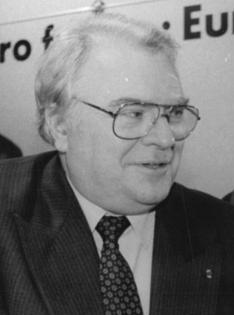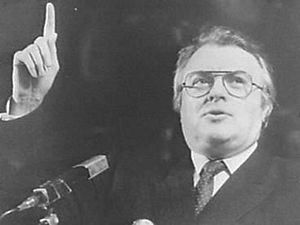Pierre Mauroy facts for kids
Quick facts for kids
Pierre Mauroy
|
|
|---|---|
 |
|
| Prime Minister of France | |
| In office 21 May 1981 – 17 July 1984 |
|
| President | François Mitterrand |
| Preceded by | Raymond Barre |
| Succeeded by | Laurent Fabius |
| President of the Socialist International | |
| In office 17 September 1992 – 10 November 1999 |
|
| Preceded by | Willy Brandt |
| Succeeded by | António Guterres |
| First Secretary of the Socialist Party | |
| In office 14 May 1988 – 9 January 1992 |
|
| Preceded by | Lionel Jospin |
| Succeeded by | Laurent Fabius |
| Mayor of Lille | |
| In office 8 January 1973 – 25 March 2001 |
|
| Preceded by | Augustin Laurent |
| Succeeded by | Martine Aubry |
| Member of the French Senate for Nord |
|
| In office 2 October 1992 – 30 September 2011 |
|
| Personal details | |
| Born | 5 July 1928 Cartignies, Nord, France |
| Died | 7 June 2013 (aged 84) Clamart, France |
| Political party | Socialist Party |
| Occupation | Teacher |
Pierre Mauroy (5 July 1928 – 7 June 2013) was a French Socialist politician. He served as Prime Minister of France from 1981 to 1984. This was during the time François Mitterrand was President. Mauroy was also the Mayor of Lille for a long time, from 1973 to 2001. When he passed away at 84, he was still known as the emeritus mayor of Lille. He died from lung cancer. Lille's new stadium, Stade Pierre-Mauroy, is named after him.
Contents
Biography
Early Life and Career
Pierre Mauroy was born in Cartignies, France. He started his career as a teacher. In the 1950s, he became a leader in the Socialist Youth Movement. He also led the Technical Teaching Union.
Mauroy quickly rose in the French Section of the Workers' International (SFIO) party. He became a key figure in the Nord region's Socialist group. By 1966, he was the second most powerful person in the party. This was right after the secretary general, Guy Mollet.
Entering Politics
After some difficult elections in 1968 and 1969, Mauroy believed the party needed to change. In 1971, he supported François Mitterrand to lead the Socialist Party (PS). Mauroy then became the second most important person in the PS.
Just two years later, he was elected as a deputy (a member of parliament). He also became the Mayor of Lille. Mauroy sometimes disagreed with Mitterrand's choices. But Mitterrand still picked him to speak for him during the 1981 presidential election. After Mitterrand won, he made Mauroy the Prime Minister.
As Prime Minister of France
Mauroy's government brought many big changes to France. They focused on improving life for ordinary people.
Social Reforms
His government made several social improvements. They reduced the normal workweek from 40 to 39 hours. The retirement age was lowered to 60 years old. People also got more paid holidays, increasing from four to five weeks.
Benefits for families and those in need also went up. Minimum pensions, rent allowances, and family allowances all increased. The minimum wage also saw a significant rise. This helped improve the living standards for many people.
Economic Changes
The government invested more in industries. They also provided loans to private businesses. New jobs were created in public services. There was a big effort to build more houses.
The government tried to make taxes fairer. They shifted the tax burden away from lower-income families. Unemployment benefits were also increased. This meant people out of work received more support for a longer time.
Support for Vulnerable Groups
Elderly people saw their minimum pensions increase a lot. Many were also excused from paying certain taxes. Families with two children received much higher family benefits. This helped reduce poverty in France.
Health care access was also improved. More part-time workers and unemployed people could get health insurance. There were also programs to encourage early retirement. This aimed to create jobs for younger workers.
New Laws and Rights
Laws about immigration were changed to be fairer. It became easier for families to reunite. Many people living in France without papers were given legal status.
A law was passed in 1983 to promote equality between men and women at work. Businesses had to report on the situation of women employees. This helped end hidden wage differences.
The government also transferred more power to local areas. This meant cities and regions had more control over planning. Measures were introduced to improve conditions in poorer neighborhoods. Public transport was made more affordable for everyone.
Education and Training
Mauroy's government created many new teaching jobs. They increased teachers' salaries, especially for elementary school teachers. Technical education became a priority. More money was given for scholarships and new technologies in schools.
Special zones were set up in poorer areas to give extra resources to schools. This helped students who were struggling. University assistants, who are junior teachers, were given more job security.
The government also made it easier for people from different backgrounds to enter top schools. They changed entrance exams to be fairer.
Worker Rights and Safety
New laws in 1982 increased the rights of trade unions and employees. These laws covered things like fair dismissal and workplace safety. Unions gained more rights to organize meetings and speak to workers.
Employers had to negotiate wages and hours every year. Workers also got more time off for union activities. Rules for health and safety in workplaces were made stronger.
The government also worked to make jobs more secure. They limited how long temporary contracts could be. They also made sure part-time workers got the same benefits as full-time workers.
Cultural Development
The Mauroy government greatly supported arts and culture. They tripled state aid for the arts. Spending on public libraries quadrupled. This led to many more books being borrowed.
Money was also given to art museums outside of Paris. Funding for local libraries increased significantly. This meant more people had access to good library resources. The government aimed to spread cultural opportunities across all of France, not just in Paris.
Challenges and Austerity
While social policies improved lives, the economic plan faced challenges. Inflation increased, and so did trade and budget deficits. Unemployment also rose, despite promises to keep it low.
This led to a change in economic policy in 1983. The government had to introduce some austerity measures. This meant reducing some benefits and increasing some costs. For example, the duration of unemployment benefits was shortened. There were also new charges for hospital stays.
Despite these measures, the government tried to protect the poorest people. Benefits for the elderly, handicapped, and some families still saw increases.
Mauroy resigned in 1984 after failing to pass a law about private schools.
After Being Prime Minister
In 1988, Pierre Mauroy became the leader of the Socialist Party. He tried to bring different groups within the party together. He worked with Lionel Jospin and others.
From 1992 to 1999, he was the President of the Socialist International. This is a worldwide group of socialist parties. He also served as a Senator from 1992. He left his role as Mayor of Lille in 2001. Mauroy was seen as an important and respected figure in French politics.
Political Career
Government Roles
- Prime Minister: 1981–1984.
Elected Positions
European Parliament
- Member of European Parliament: 1979–1980.
National Assembly of France
- Member of the National Assembly of France for Nord: 1973–1981, then 1984–1992.
Senate of France
- Senator of Nord: 1992–2011.
Regional Council
- President of the Regional Council of Nord-Pas-de-Calais: 1974–1981.
- Regional councillor of Nord-Pas-de-Calais: 1974–1981, then 1986–1988.
General Council
Municipal Council
- Mayor of Lille: 1973–2001.
- Deputy-mayor of Lille: 1971–1973.
- Municipal councillor of Lille: 1971–2008.
Urban Community Council
- President of the Urban Community of Lille Métropole: 1989–2008.
- Vice-president of the Urban Community of Lille Métropole: 1971–1989.
- Member of the Urban Community of Lille Métropole: 1971–2008.
Party Leadership
- First Secretary (leader) of the Socialist Party (France): 1988–1992.
Images for kids
See also
 In Spanish: Pierre Mauroy para niños
In Spanish: Pierre Mauroy para niños
 | Shirley Ann Jackson |
 | Garett Morgan |
 | J. Ernest Wilkins Jr. |
 | Elijah McCoy |



